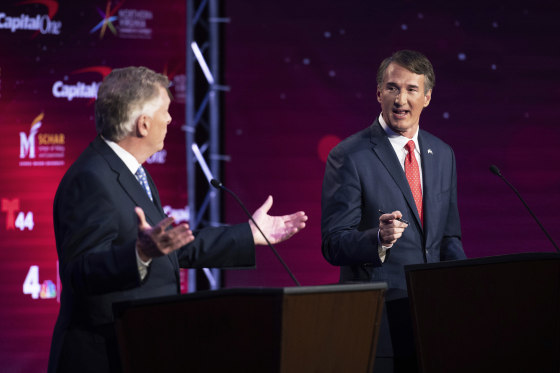WASHINGTON — An interesting thing happened at last night’s gubernatorial debate in Virginia: Democrat Terry McAuliffe and Republican Glenn Youngkin turned their attention to the state’s swing voters — and not the base — as the campaign hits the final stretch.
McAuliffe, for instance, stressed his bipartisan credentials. “I worked in a bipartisan manner [as governor]. And guess what? We created 120,000 new jobs.”
Youngkin praised the bipartisan infrastructure bill. “I believe that there is good future in the infrastructure bill. And I look forward to those funds coming to Virginia and puttin' 'em to work.”
So did McAuliffe, who also said that the price tag of congressional Democrats’ $3.5 trillion reconciliation bill is too hefty. “I think the $3.5's too high.”
McAuliffe criticized the chaos coming from Capitol Hill. “But here's my message to Congress: I'm really sick and tired of all of 'em.”
Youngkin tried to sidestep a question about Donald Trump before acknowledging he’d back him in 2024 if he becomes the GOP presidential nominee. “Who knows who's gonna be running for president in 2024,” he said, later adding: “If he's the Republican nominee I'll support him.”
And McAuliffe wouldn’t answer if he’d back a unionization drive by Amazon workers in Northern Virginia. "Businesses make their own decision, and employees make their own decisions. Whatever they wanna do."
So much of our current politics is about mobilizing the base. But in Virginia last night, McAuliffe was trying to cast himself as a pro-business, bipartisan, yet socially liberal Democrat.
And Youngkin was trying to cast himself as a socially conservative Republican who wouldn’t go Full Trump.
Big differences on vaccines and abortion
All of that said, the debate’s exchanges on vaccine mandates and abortion revealed the biggest difference between the two candidates.
McAuliffe maintained — again — that he supports a Covid vaccine mandate for all of Virginia’s workers. “We cannot move this economy forward and keep our schools open if we're not getting our folks vaccinated.”
Youngkin, meanwhile, urged Virginians to get vaccinated, yet he added: “But I don't think we should mandate it.”
When Youngkin was asked if getting vaccinated for the measles, mumps and rubella should also be a choice, he replied: “Data associated with those vaccines is something that we should absolutely understand the difference between this [Covid] vaccine.”
And on abortion, McAuliffe said he wanted the right to an abortion enshrined in the state’s constitution, while Youngkin said he opposed it.
How low can you go?
Just how rough have the last six weeks — rising Covid cases, Afghanistan withdrawal, chaos on Capitol Hill — been for President Biden?
Answer: A new Quinnipiac poll (Sept. 24-27) has his job approval rating in Texas at just 32 percent among registered voters in the state.
And a new national online ABC/Ipsos poll (Sept. 24-28) shows declining approval ratings for Biden’s handling of the pandemic (from 64 percent in August to 57 percent now), the economic recovery (55 percent to 51 percent), crime (46 percent to 43 percent) and immigration (41 percent to 33 percent).
Data Download: The numbers you need to know today
More than 22 percent: The malnutrition rate in the Tigray region amid a crisis that a top U.N. official called a “stain on our conscience” in a recent interview.
23: The number of species (22 animal, one plant) expected to be declared extinct in America during a Wednesday announcement.
38 percent: The portion of adults receiving Covid vaccines in the past three months who said seeing hospitals filling up was a major reason for their decision to get vaccinated, per the Kaiser Family Foundation’s new polling.
36 percent: The portion of those recently vaccinated adults who told KFF a major reason for getting vaccinated recently was because someone they know became seriously ill or died from Covid.
43,277,196: The number of confirmed cases of the coronavirus in the United States, per the most recent data from NBC News and health officials. (That’s 120,983 more since yesterday morning.)
697,199: The number of deaths in the United States from the virus so far, per the most recent data from NBC News. (That’s 2,557 more since yesterday morning.)
391,152,574: The number of vaccine doses administered in the U.S., per the CDC. (That’s 487,651 more since yesterday morning.)
55.8 percent: The share of all Americans who are fully vaccinated, per the CDC.
66.7 percent: The share of all U.S. adults at least 18 years of age who are fully vaccinated, per CDC
Tweet of the day
ICYMI: What else is happening in the world
Progressives are reiterating their threat to vote down the bipartisan infrastructure bill if the House hasn’t already passed the larger social safety net spending first.
Meanwhile, Democrats are racing to find an agreement that would prevent the government from shutting down.
Texas’ new proposed congressional maps would protect incumbents and shore up the GOP’s strong majority in the delegation.
Massachusetts Democratic Sen. Elizabeth Warren called Federal Reserve Chair Jerome Powell a “dangerous man” and said she wouldn’t back any plan to renominate him for a second term.
David Chipman, whose nomination to lead ATF was withdrawn by Biden, told the New York Times said that limited communication from the White House during his confirmation process left him feeling like he was on an “island.”
Japan is set to have a new prime minister.
South Dakota’s attorney general says he’s looking into concerns stemming from Associated Press reporting that Republican Gov. Kristi Noem met with state employees overseeing her daughter’s attempts to become a real estate appraiser shortly after her daughter was denied certification.



